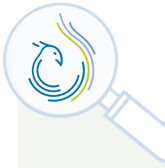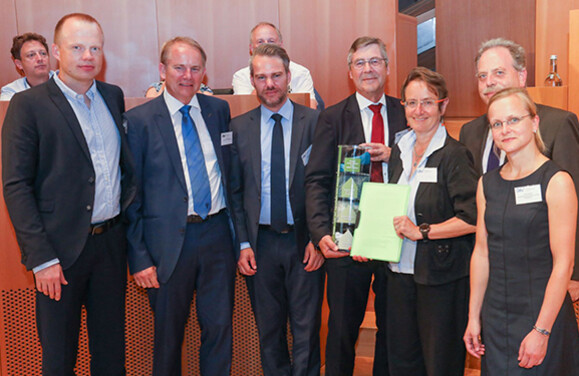

28. June 2019
ERDE commits to taking back and recovering crop plastics

Berlin, 27 June 2019 – The initiative within the German Association for Plastic Packaging and Films (IK) known as ERDE (Erntekunststoffe Recycling Deutschland – crop plastics recycling in Germany) is undertaking to collect and recycle 65 per cent of all silage and stretch films marketed in Germany by 2022. The voluntary commitment was presented in Berlin during a parliamentary evening of the plastics processing industry on 26 June 2019. Dr. Regina Dube, Head of the Department Water Management, Resource Protection and Adaptation to the Climate Change, accepted the voluntary commitment on behalf of the Federal Environment Ministry. Besides the ERDE initiative, signatories include IK Industrievereinigung Kunststoffverpackungen (German Association for Plastic Packaging and Films), Deutscher Raiffeisenverband (German Cooperatives’ Association), Bundesverband der Agrargewerblichen Wirtschaft (German Agricultural Trading Association) and Bundesverband Lohnunternehmen (German Agricultural Contractors’ Association).
“The aim is collect and recycle all crop plastics in order to close the loop and avoid plastics escaping into the ground and the environment,” says ERDE Director and IK Managing Director Dr Jürgen Bruder, explaining the ambitious goals of the ERDE initiative. He goes on to say, “Manufacturers and distributors of agricultural films form the initiative's backbone, as it is only their considerable financial commitment that makes it possible to recover the used films in a cost-effective way. It is a real example of extended product responsibility.” At the same time, extending recycling also reduces CO2 emissions.
So far, ERDE has collected and recycled 25 per cent of silage and stretch films. Around 70 per cent of the agricultural films that are collected are recycled in Germany, with the remaining 30 per cent being recycled in other EU countries. The used films are turned into valuable raw materials for e.g. new agricultural and construction films, irrigation hoses and refuse sacks.
Next objective: integration of asparagus films, round bale netting and mulch films
The declared aim of the voluntary commitment is the inclusion of additional crop plastics in the collection and recovery system. While silage and stretch films account for the majority of applications – two-thirds in all – asparagus films, round bale netting and mulch films will also be integrated into the circular system in future. ERDE is thus seeking to establish a holistic recycling solution for all crop plastics.
Agricultural trading businesses, agricultural contractors and farmers – important mainstays for ERDE's success
The ERDE system is based on a large number of collection points set up by members of the agricultural traders’ and agricultural contractors’ associations in collaboration with system operator RIGK GmbH.
“The concept of return only works if manufacturers, distributors and farmers work closely together,” says Dr Henning Ehlers, President of the German Cooperatives’ Association in explanation of the motives for their support: “Our cooperative businesses share a commitment to the ERDE initiative, creating more and more collection points and thereby emphasising their understanding of the sustainable use of resources.”
Farmers and agricultural contractors make an active contribution to recycling by ensuring the clear separation of materials and preliminary cleaning.
The progress of the ERDE initiative is reviewed by an external body on an annual basis. New milestones will be established in cooperation with the Federal Environment Ministry in 2023.
Further more information about ERDE-Recycling you find here.
About IK Industrievereinigung Kunststoffverpackungen e.V. (German Association for
Plastic Packaging and Films)
As an industry lobby group, IK Industrievereinigung Kunststoffverpackungen represents the interests of producers of plastic packaging and films in Germany and Europe. The sectors is made up predominantly of medium-sized business and employs over 90,000 people while generating annual sales of EUR 15 billion. Plastic packages currently have a 44 per cent share of the German packaging market. IK is the largest member association in the Gesamtverband Kunststoffverarbeitende Industrie (GKV – German Association of Plastics Converters) and hence also actively promotes the interests of the entire plastics processing industry.
Deutscher Raiffeisenverband (DRV – German Cooperatives’ Association):
DRV represents the interests of cooperatively organised businesses in the German agricultural and food sector. Forming an important link in the value chain, the 2,024 DRV member businesses generate sales of EUR 63.6 billion with their approx. 82,000 employees in the production, distribution and processing of plant and animal products. Farmers, market gardeners and winegrowers are members and thereby owners of the cooperatives.
About Bundesverband der Agrargewerblichen Wirtschaft (BVA – German Agricultural
Trading Association):
Bundesverband der Agrargewerblichen Wirtschaft (BVA) is the lobby for private agricultural traders in Germany. BVA members are largely medium-sized businesses with different legal forms that trade in grain, animal feed, oilseed, renewable resources, seed as well as fertilisers and crop protection products. They also process agricultural raw materials supplied by farmers such as grain and oilseed through drying and cleaning, and market these products as foodstuffs and animal feed domestically and internationally.
About Bundesverband der Agrargewerblichen Wirtschaft (BVA – German Agricultural
Trading Association):
Bundesverband der Agrargewerblichen Wirtschaft (BVA) is the lobby for private agricultural traders in Germany. BVA members are largely medium-sized businesses with different legal forms that trade in grain, animal feed, oilseed, renewable resources, seed as well as fertilisers and crop protection products. They also process agricultural raw materials supplied by farmers such as grain and oilseed through drying and cleaning, and market these products as foodstuffs and animal feed domestically and internationally.